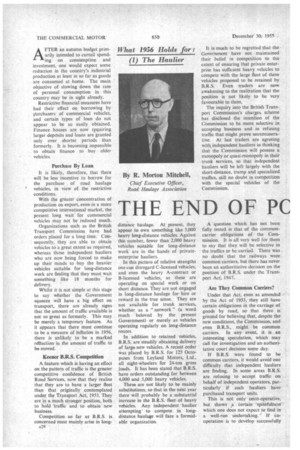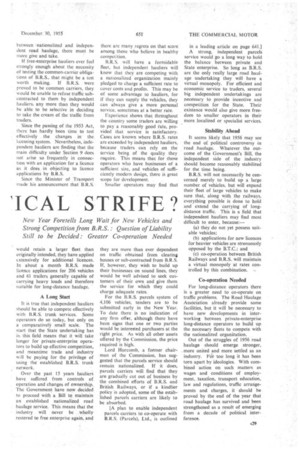HE END OF PC ICAL STRIFE?
Page 30

Page 31

If you've noticed an error in this article please click here to report it so we can fix it.
By R. Morton Mitchell,
Chief Executive Officer, Road Haulage Association AFTER an autumn budget primarily intended to curtail spending on consumption and investment, one would expect some reduction in the country's industrial production at least in so far as goods are consumed at home. The main objective of slowing down the rate of personal consumption in this country may be in sight already.
Restrictive financial measures have had their effect on borrowing by Vurchasers of commercial vehicles, and certain types of loan do not appear to be so easily obtained. Finance houses are now requiring larger deposits and loans are granted only over shorter. periods than formerly. It is becoming impossible to obtain finance to buy older vehicles.
Purchase By Loan It is likely, therefore, that there will be less incentive to borrow for the purchase . of road haulage vehicles, in view of the restrictive conditions.
With the greater concentration of production on export, even tin a more competitive international market, the present long wait for commercial vehicles may not be reduced much.
Organizations such as the British Transport Commission have had orders placed for a long time. Consequently, they are able to obtain vehicles to a great extent as required, whereas those independent hauliers who are now being forced to make up their minds to buy the heavier vehicles suitable for long-distance work are ftnding that they must wait something like 18 months for delivery. • Whilst it is not simple at this stage to say whether the Government squeeze will have a big effect on transport, there are already signs that the amount of traffic available is not so great as formerly. This may be merely a temporary feature. As it appears that there must continue to be a measure of inflation in 1956, there is unlikely to be a marked reltluction' in the amount of traffic to be moved.
Keener B.R.S. Competition A feature which is having an effect on the pattern of traffic is the greater competitive confidence of British Road Services, now that they realise that they are to have a larger fleet than that originally contemplated under the Transport Act, 1953. They are in a much stronger position, both to hold 'traffic and to obtain new business.
Competition so far as B.R.S. is concerned must mainly arise in long distance haulage, At present, they appear to own something like 5,000 heavy long-distance vehicles. Against this number, fewer than 2,000 heavy vehicles suitable for long-distance work are in the hands of privateenterprise hauliers.
In this picture of relative strengths one can disregard C-licensed vehicles, and even the heavy A-contract or B-licensed vehicles, as these are operating on special work or on short distance. They are not engaged in long-distance haulage for hire or reward in the true sense. They are not available for trunk services, whether as a " network " (a word much beloved by the present Government) or merely as vehicles operating regularly on long-distance routes.
In addition to retained vehicles, B.R.S. are steadily obtaining delivery of large new vehicles. A recent order was placed by B.R.S. for 125 Octopuses from Leyland Motors, Ltd., all eight-wheelers for 24-ton gross loads. It has been stated that B.R.S. have orders outstanding for between 4,000 and 5,000 heavy vehicles.
These are not likely to be mainly substitutions, so that in the next year there will probably be a substantial increase in the B.R.S. fleet of heavy vehicles. Any independent haulier attempting to compete in longdistance haulage will face a formidable organization. It is much to be regretted that the Government have not maintained their belief in competition to the extent of ensuring that private enterprise has sufficient heavy vehicles to compete with the large fleet of these vehicles proposed to be retained by B.R.S. Even traders are now. awakening to the realization that the position is not likely to be very favourable to them.
The inquiry into the British Transport Commission's charges scheme has disclosed the intention of the Commission to be more selective in accepting business and in refusing traffic that might prove unremunerative. At last traders are agreeing with independent hauliers in thinking that the Commission will possess a monopoly or quasi-monopoly in their trunk services, so that independent hauliers will be left largely with the short-distance, tramp and specialized traffics, still no doubt in competition with the special vehicles of the Commission.
A question which has not been fully tested is that of the commoncarrier obligations of the Commission. It is all very well for them to say that they will be selective in the traffics to be carried. There was no doubt that the railways were common carriers, but there has never been an authoritative decision on the position of B.R.S. under the Transport Act, 1947.
Are They Common Carriers?
Under that Act, even as amended by the Act of 1953, they still have certain obligations in the carriage of goods by road, so that there is ground for believing that, despite the new conditions, the Commission, and even B.R.S., might be common carriers. In any event, it is an interesting speculation, which may call for investigation and an authoritative court decision some day.
If B.R.S. were • found to be common carriers, it would avoid one difficulty that independent hauliers are finding. In some areas B.R.S. are refusing to accept traffic on behalf of independent operators, particularly if such hauliers have purchased transport units.
This is not only unco-operative, but shows a certain 'spitefulness'— which one does not expect to find•in. a well-run undertaking. If cooperation is to develop successfully
between nationalized and independent road haulage, there must be more give and take.
If free-enterprise hauliers ever feel strongly enough about the necessity of testing the common-carrier obligations of B.R.S., that might be a test worth making. If H.R.S. were proved to be common carriers, they would be unable to refuse traffic sub• contracted to them by independent hauliers, any more than they would he able to be selective in deciding to take the cream of the traffic from traders.
Since the passing of the 1953 Act, there has hardly been time to test effectively the changes in the licensing system. Nevertheless, independent hauliers are .finding that the main difficulty under Section 9 does not arise so frequently in connection with an application for a licence as it does in objecting to licence applications by B.R.S.
Since the Minister of Transport made his announcement thatB.R.S.
would retain a larger fleet than originally intended, they have applied extensively for additional licences. In about a month B.R.S. made licence applications for 206 vehicles and 61 trailers generally capable of carrying heavy loads and therefore suitable for long-distance haulage.
A Long Start It is true that independent hauliers should be able to compete effectively with B.R.S. trunk services. Some operators do so today, but only on a comparativelY small scale. The start that the State undertaking has in this field means that it will take longer for private-enterprise operators to build up effective competition, and meantime trade and industry will be paying for the privilege of using the established B.R.S. trunk network.
Over the past 15 years hauliers have suffered from controls of operation and changes of ownership. The Government have now decided to proceed with a Bill to maintain an established nationalized road haulage service. This means that the industry will never be wholly restored to free enterprise again, and
there are many regrets on that score among those who believe in healthy competition.
B.R.S. will have a formidable fleet, but independent hauliers will know that they are competing with a nationalized organization mainly pledged to charge a sufficient rate to cover costs and profits. This may be of some advantage to hauliers, for if they can supply the vehicles, they can always give a more personal service, sometimes at a better rate.
Experience shows that throughout the country some traders are willing to pay a reasonably good tate, provided that service is satisfactory. Cases are known where B.R.S. rates. are exceeded by independent hauliers, because traders can rely on the Service being of the quality they require. This means that for those operators who have businesses of a sufficient size, and vehicles of sufficiently modern design, there is great scope for development.
Smaller operators may find that they are more than ever dependent on traffic obtained from clearing houses or sub-contracted from B.R.S. If, however, they wish to build up their businesses on sound lines, they would be well advised to seek customers of their own and give them the service for which they could charge adequate rates.
For the B.R.S. parcels system of 4,106 vehicles, tenders are to be submitted early in the New Year. To date there is no indication of any firm offer, although there have been signs that one or two parties would be interested purchasers at the right price. As with all other assets offered by the Commission, the price required is high.
Lord Hurcotnb, a fothner chairman of the Commission, has suggested that the parcels service should remain nationalized. If it does, parcels carriers will find that they are gradually cut out of business by the combined efforts of B.R.S. and British Railways, or if a kindlier policy is adopted, some of the established parcels carriers are likely to be absorbed.
[A plan to enable independent parcels carriers to co-operate with B.R.S. (Parcels), Ltd., is outlined in a leading article on page 641.1
A strong, independent parcels service would go a long way to hold the balance between private and State enterprise. So long as B.R.S. are the only really large road haulage undertaking they will have a virtual monopoly. For efficient and economic service to traders, several big independent undertakings are necessary to provide incentive and competition for the State. Their existence would also give more freedom to smaller operators in their more _localized or specialist services.
Stability Ahead It seems likely that 1956 may see the end of political controversy in road haulage. Whatever the outcome of the Government's Bill, the independent side of the industry should become reasonably stabilized for the time being.
B.R.S. will not necessarily be concerned merely to build up a large number of vehicles, but will expand their fleet of large vehicles to make sure that, along with the railways, everything possible is done to hold and extend the carrying of longdistance traffic. This is a field that ind,ependent hauliers may find most difficult to enter, because:—
(a) they do not yet possess suitable vehicles; (b) applications for new licences for heavier vehicles are strenuously opposed by the B.T.C.; and (c) co-operation between British Railways and B.R.S. will maintain a virtual monopoly at rates controlled by this combination.
Co-operation Needed For long-distance operators there is a greater need to co-operate on traffic problems. The Road Haulage Association already provide some facilities, but it will be necessary to have new developments in interworking between private-enterprise long-distance operators to build up the necessary fleets to compete with the nationalized organization.
Out of the struggles of 1956 road haulage should emerge stronger, more united and more settled as an industry. For too long it has been torn apart by ideologies. With combined action on such matters as wages and conditions of employment, taxation, transport education, law and regulations, traffic arrangements and charges, it should be proved by the end of the year that road haulage has survived and been strengthened as a result of emerging from a decade of political interference.




















































































